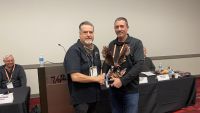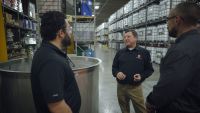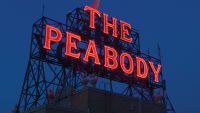Contractor to Contractor: Brazos Masonry
By Masonry
Mackie Bounds - Brazos Masonry, Waco, Texas
Architects and owners across the nation call Brazos Masonry for their fine masonry and stone work. This bold statement is backed up by the fact that Mackie Bounds and his company have been rated in the Top 20 Specialty Contractors in the U.S. by Engineering News-Record magazine and won 13 different awards in the past year alone. Bounds gives all of the credit to his workers, though. "My craftsmen have taken this company a long, long way," says Bounds.
Masonry: Brazos Masonry won Best of Show ? Stone and Honorable Mentions for two different projects at the MCAA International Excellence in Masonry Awards in March. Tell us more about both of these projects.
Bounds: Both of these projects are very unique. I'll start with Pat Neff Hall for Baylor University, the restoration project first.
We worked very close with the engineer, put some very key personnel out on the project and that job went from looking like it was about time to be demoed to looking so great that most of the people's comments are "It's the most beautiful building on campus." And it really and truly is. It's just gorgeous.
We replaced stone ? we had stone actually re-carved, replaced the re-carved pieces, and then my craftsman patched some of the old stones to the point that you cannot even see the patch. Normally, inspection takes place 20 feet from the face of the building; we had people up within three feet of the building saying "Where's the patch?" It made my craftsman feel great.
The other project that won Best of the Show and honorable mention in the division that it was placed in was McClurg Hall for the University of the South in Suwanee, Tenn. This project is a phenomenal stone project and what was so unique about it was the owner was my stone supplier. They quarried the stone and cut the stone ? all of the sandstone were cut at the University by their little one-horse stone mill. They did a great job.
Then our craftsmen were called upon to actually do some hand-work with the stone once we started laying it. Most of the buildings on this campus were built in the early 1900s. In fact, the chapel that we worked on was originally constructed in 1905, and it's the dream of any mason contractor ? every type of stone masonry you can imagine is in it.
Malcomb Holtzman, the architect, was called upon to design a building that would fit into the rest of the campus. When he first started telling me about this project, I was wondering: "How is this going to work, sitting next door to a 1905 structure?" Craftsmen today are different than they were back then, techniques are different now than they were then. As you look at the project, it doesn't stand out as a project that was built in 2001-2002. It fits into the campus.
I give all of the credit to my craftsmen, I don't mind telling you. My craftsmen were outstanding in their techniques and with their work ethics on this project; the quality of this project ? you can't find any blemishes on it. It's just phenomenal.
Masonry: Brazos Masonry has also won several other awards over the years. What is Brazos Masonry doing that others aren't to win such prestigious honors?
Bounds: I'm going to tell you where my heart is on this question. It is a matter of treating people like they're people, respecting people like they're people, and they will want to work for you. They will want to perform for you. I don't want to be boastful, because that's just not my style, but I do want to boast about my people.
Obviously, we've got a group of individuals who put quality first ? and when I say quality, there is also safety ? safety is always understood to be first in my organization. When you work safely, you'll produce quality work.
Over the years I have formed a group of craftsmen who knows what our benchmark is. And I always tell my people that I'm not really interested in anything less than the best. If they can't perform to their very best, then they're working for the wrong company. I've had people work for me since this company has been in existence, which has been 14 years, going on 15 now. They're proud to be a part of the company.
Masonry: What do you think has been the key to Brazos Masonry's growth and success over the years?
Bounds: I think it goes back to the fact, again, that we're very progressive and we do not mind stepping out and being leaders. Some examples: We were one of the first mason contractors to hire a full-time safety director. We had some competitors tell us, "You're nuts!" ? but now they're trying to follow suit.
I was one of the first to hire a full-time marketing director. Again, I was told that I was nuts. But we're out promoting masonry, not only to general contractors, but to the architects.
Our philosophy is: If you get them to design with masonry, then we've got a shot at doing the job. I won't get every job that I change to masonry, but that's OK. If more projects are designed with masonry, I will have more opportunity for work, I will have more opportunity for a higher profit margin, and as a result, we will be more successful.
Another success for our company is we have three general superintendents that oversee our work. A lot of companies will not have this level of management in their company, but I think it's very important.
Masonry: Mackie, you have participated at a higher level in the masonry world for some time. What is your reasoning behind being so active in the masonry community and what would you say to a mason contractor who isn't active?
Bounds: I'm going to tell you the reason behind being active first. I was taught as a kid that if you're going to help, you have to get involved. Obviously, our industry can improve. I think we've had some great leaders in our industry who have taken us to where we're at. But if other leaders do not come along, we will start sliding backwards. So, my reason for involvement is to only help our industry, and when I help our industry, I will help my company as a result.
I just feel it's time for us to listen to the late John F. Kennedy Jr., who said, "Ask not what your country can do for you; ask what you can do for your country." I kind of made that my motto for my business. Rather than asking what the mason industry can do for me, I like to say, "What can I do for my industry?" And the only way I can do anything for my industry is to get involved.
To those contractors who are not active in a masonry association, they're losing money on their bottom line ? simple as that. I was talking to a mason contractor at the Masonry Showcase who was not a member of MCAA and I pointed out to him, "The size your company is, for $600 you can be a member of this organization that supports our industry, that helps make our industry stronger, and that helps promote our industry within the construction industry. Before you get home, you will waste $600. And the money you waste is not helping your profits statement at the end of the year. This money will help our profits statement. Notice what this association does: not only does it promote masonry, it is also fighting for legislation that affects our profit.
It is frustrating for me to see people sitting on the sidelines and trying to reap the benefits of what others are doing. It kind of makes me happy when I see them trying to do it and they can't achieve it. The reason they can't achieve it is they haven't been involved and they don't know how to achieve it.
Masonry: What do you feel is the biggest misconception about the masonry industry?
Bounds: The biggest misconception that I see, when dealing with people in the construction industry, is they've got the idea that the masonry industry never changes. That we're just an old, old industry, still doing things the old way and that we're very closed minded. Well, there's nothing further from the truth.
I feel that we're a very progressive industry. I believe that we're changing every day, new products are coming out, new equipment is being used, new techniques are being used. We went through a man power crunch and what did we do? We found new techniques, new equipment, new ways to overcome this.
Masonry: What would you do to change that misconception?
Bounds: I think everybody needs to do what I'm doing. I think they need to hire a marketing director and get the message out. And let me tell you something, my marketing director does wonders. He shocks people sometimes when he says, "Hey, we can do this." Well, we didn't know it could be done that way.
Masonry: What are your three biggest concerns in keeping your company successful?
Bounds: Not in any particular order, but one of my concerns, of course, is quality craftsmen. And that's a major concern across the board because our industry kind of had a black mark that we were a dying industry and that we didn't have any new blood coming in. I don't ever want to see us going back to that point. I think we have overcome that black mark, but now let's stay on top of it.
Another concern of mine is market share ? obviously that's a concern of mine, otherwise I wouldn't have a marketing director. We have lost more market share within the construction industry than any other industry. We have to turn that tide. We have to turn it around and reclaim our market share.
The third thing that concerns me is what our lawmakers are doing. What kind of bills are passing that are going to affect my profit? That's the way I look at every bill. Every bill that is passed in Washington, D.C., or on the state level affects my profit. That's why, once again, people need to be involved in the Association so that they have a radar there that constantly monitors what's going on, it can be brought to our attention, and then we can have a voice on it.
Masonry: What do you feel is the industry's biggest challenge in the near future?
Bounds: If there's a single challenge, one that I believe if we don't overcome it could be devastating to us, is the fact that we're looked at as such a fragmented industry. We've got to bring the fragments together. Somebody has to be a magnet and pull everybody together. MCAA has stepped forward and said, "We want to be that magnet." I feel that members need to get involved and help this organization be that magnet. If we continue to be fragmented, there is no way that we can reclaim our market share. That's at the base of our problem.
I biggest challenge is that we have to convince everyone that this has to happen. We've got to get the brick people, the block people, and the stone people all at the same table.
I think we're taking a giant step in the right direction with joining up with Construct America and CSI. I think it's equally important for us to get the brick, block and stone people together so that we're a single voice for the masonry community. We'll all benefit ? that's what's so frustrating for me. We can accomplish so much more together than we can going separate ways.
Masonry: What do you think will be the masonry industry's biggest competitor in 10 years?
Bounds: I think it will continue to be the tilt wall industry. I can't see it otherwise. Why do I say that? I have great respect for their marketing capabilities. They have a great philosophy, they're very aggressive, and they're a very progressive industry. They are always changing too. I believe that, even 10 years from now, we're going to be faced with the fact of them being our Number 1 competitor.
Masonry: What do you feel are the most critical issues you'll face with future government regulations?
Bounds: That would definitely be OSHA. OSHA's a constantly changing world and, depending on who's in control of Congress, it becomes an even greater factor. What's been our biggest challenge in the past? It's been OSHA regulations. Do I see anything changing? No, OSHA will continue to affect us the most.
Another factor has come on to the scene: homeland security. I think it's something that we need to get involved in, get to the right people with, and make sure that masonry is not designed out of projects. We need to show them how masonry will strengthen homeland security. I almost would put that ahead of the OSHA regulations because it has become such a big issue. Our industry can benefit if we will step in and take control of this issue and show how we can help with homeland security.
Masonry: Which group do you feel has the bigger impact on masonry's future: architects, engineers or general contractors?
Bounds: I kind of put architects and engineers in the same bag. General contractors are not the same general contractors that we once knew. They have become more like construction managers.
The architects and engineers have the most critical impact on our industry. That's why, once again, it's so important that we're marketing our product to these people. They're the ones talking to Mr. and Mrs. Owner. The owners hired them for a reason: because they respect their knowledge and understanding. If we cannot sell our product to the architect and engineers, we're in deep water.
Masonry: What do you like most about being a member of MCAA?
Bounds: I think I've pretty much told you. I'll just sum it all up. It's an opportunity for me to be a part of my industry, it's an opportunity for me to learn, and it's an opportunity for me to give to my industry. As a result, my industry will be a better industry.
About the Author
Masonry, the official publication of the Mason Contractors Association of America, covers every aspect of the mason contractor profession - equipment and techniques, building codes and standards, business planning, promoting your business, legal issues and more. Read or subscribe to Masonry magazine at www.masonrymagazine.com.















